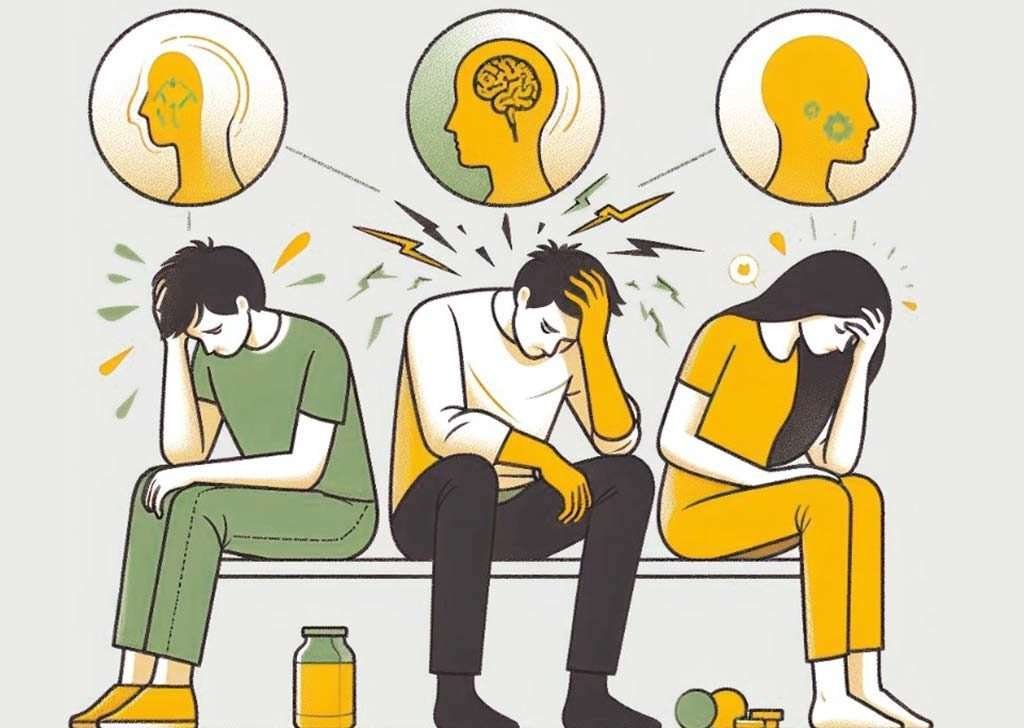If you’re dealing with a “mind problem,” such as stress, anxiety, or feelings of being overwhelmed, it’s important to remember that you’re not alone. Many people experience mental health challenges at various points in life. Here are a few steps to help you through it:
- Acknowledge Your Feelings: It’s okay to not feel okay. Recognizing and accepting how you feel is the first step toward managing it.
- Talk to Someone: Reach out to a friend, family member, or professional. Sharing what you’re going through can lighten the burden and offer new perspectives.
- Practice Self-Care: Take care of your mental and physical health. This could mean taking a break, exercising, practicing mindfulness, or just doing something you enjoy.
- Seek Professional Help: If feelings of sadness, anxiety, or stress are persistent, seeking guidance from a mental health professional, such as a therapist, can be really helpful.
- Join a Support Group: Sometimes it helps to talk to others who are going through similar challenges. There are many online and offline groups that focus on mental health support.
You’re Not Alone: Understanding and Overcoming Depression
Depression can feel overwhelming, but it’s important to remember that you’re not alone. Millions of people experience depression, and there are ways to manage it and seek support.
What is Depression?
Depression is more than just feeling sad or having a bad day. It’s a mental health condition that affects how you think, feel, and act. Common symptoms include persistent sadness, loss of interest in activities, fatigue, and difficulty concentrating.
Why You Shouldn’t Face It Alone
Depression often makes people feel isolated, but reaching out to friends, family, or professionals can make a big difference. Opening up about how you’re feeling helps others understand and support you through tough times.
Seeking Professional Help
Talking to a therapist or counselor is a crucial step. They can help you understand your emotions and provide coping strategies. Medications like antidepressants might also be recommended by a healthcare provider.
Self-Care Strategies
While professional help is important, taking care of yourself is equally essential. Regular exercise, a healthy diet, and adequate sleep can improve mood. Mindfulness practices like meditation can also help manage stress and anxiety.
Connect with Others
Joining a support group, whether online or in person, can offer comfort by connecting with others who are going through similar experiences. Sometimes, just knowing you’re not alone makes a world of difference.

You’re not alone in feeling overwhelmed by life’s challenges, remember that support is available. Finding solace in community and seeking help can provide comfort and guidance during difficult times.
It is natural to experience periods of doubt and struggles, but reaching out and connecting with others can offer a sense of belonging and understanding. By realizing that others share similar experiences and emotions, you can find strength in unity and solidarity.
Embracing vulnerability and opening up to receive assistance is a courageous step towards healing and growth. Remember, seeking support is not a sign of weakness, but a courageous act of self-care and resilience. Let’s explore how you can navigate difficult times with the help of others.
The Power Of Connection
When it comes to mental health, one of the most powerful tools we have is the ability to connect with others. The power of connection cannot be underestimated, as it has the ability to uplift, inspire, and provide comfort in times of need. Through finding strength in community and building support systems, we can navigate the challenges of mental health with a sense of unity and resilience.
Finding Strength In Community
Humans are social creatures by nature, and our mental well-being is often deeply connected to the quality of our relationships. Building connections with like-minded individuals who share similar experiences can be a pivotal factor in our journey towards healing. Finding strength in community means finding a safe space where we can be vulnerable, where our struggles are understood and accepted without judgment. Being part of a community can offer a sense of belonging, which is crucial for our mental health.
Support Systems And Mental Health
When facing mental health challenges, having a strong support system becomes vital. These support systems can include friends, family members, support groups, therapists, and online communities. It is through these networks that we find solace, encouragement, and guidance. Support systems provide us with the empathy and validation we need to navigate our mental health journeys. They can offer insights, coping mechanisms, and resources that we may not have found on our own.
Moreover, support systems can help us avoid feelings of isolation and loneliness, which are often associated with mental health struggles. Knowing that we are not alone in our experiences can be immensely comforting. Whether it’s attending support group meetings or seeking professional help, building a strong support system can make all the difference in our mental well-being.
In conclusion, the power of connection in the realm of mental health cannot be understated. By finding strength in community and cultivating support systems, we create an environment that encourages growth, resilience, and healing. Through connection, we empower ourselves and others, reminding ourselves that we are not alone in our journeys.
Breaking The Stigma
Challenging Misconceptions can help shift societal attitudes toward mental health issues.
Challenging Misconceptions
Dispelling myths can foster a more supportive environment for those struggling with mental health.
Promoting Understanding And Acceptance
Encouraging open conversations can reduce the shame and isolation associated with mental health challenges.

Navigating Mental Health Challenges
Navigating Mental Health Challenges can be a daunting journey, but remember, You’re Not Alone. It’s essential to recognize Signs of Distress and know when to seek Professional Help.
Recognizing Signs Of Distress
- Notice changes in mood, behavior, or thought patterns.
- Pay attention to sleep, appetite, and energy levels fluctuations.
Seeking Professional Help
- Reach out to a qualified therapist or counselor for support.
- Consider medication as prescribed by a psychiatrist.
Coping Strategies
When faced with challenges, it’s important to have coping strategies in place to help navigate the difficulties. These strategies can provide us with the necessary tools to manage stress, maintain a positive mindset, and find ways to cope with whatever life throws our way. A few effective coping strategies include practicing mindfulness and meditation, as well as engaging in physical and creative outlets.
Mindfulness And Meditation
Mindfulness and meditation are powerful practices that can help individuals find calm amidst chaos. By focusing on the present moment and observing our thoughts and emotions without judgment, mindfulness allows us to cultivate a sense of inner peace and reduce anxiety. Meditation, on the other hand, involves intentional relaxation techniques and deep breathing exercises to quiet the mind and promote mental clarity.
Physical And Creative Outlets
Engaging in physical activities and creative outlets can offer tremendous benefits for our emotional well-being. Physical exercise not only helps reduce stress and anxiety, but it also releases endorphins that boost mood and promote overall mental health. Whether it’s taking a brisk walk, practicing yoga, or participating in team sports, finding a physical outlet that brings joy and relaxation can be incredibly beneficial.
Meanwhile, creative outlets such as painting, writing, or playing a musical instrument allow us to express ourselves and channel our emotions in a positive way. These activities provide a sense of accomplishment, promote self-expression, and often serve as a form of therapy.
Building Resilience
Building resilience is an essential skill that empowers individuals to navigate life’s challenges with strength and adaptability. By developing resilience, individuals can withstand adversity, bounce back from setbacks, and thrive in the face of adversity.
Embracing Vulnerability
Embracing vulnerability is a powerful first step toward building resilience. Being open and honest about one’s struggles creates a foundation for growth. It allows individuals to seek support and recognize that vulnerability is not a weakness, but a source of strength. By acknowledging and accepting vulnerabilities, individuals can start to build the resilience needed to overcome life’s obstacles.
Finding Purpose
Finding purpose is a key factor in building resilience. Identifying a sense of purpose provides individuals with the motivation and determination to overcome challenges. Whether it’s through personal passions, meaningful relationships, or contributing to a larger cause, having a clear purpose can help individuals navigate adversity with determination and resilience.
Supporting Others
In times of struggle, it’s important to remember that supporting others can make a significant difference. Whether it’s a friend, family member, or colleague, your genuine care and understanding can provide a lifeline to those in need.
Creating A Safe Space For Expression
Creating a safe space for expression involves fostering an environment where individuals feel comfortable sharing their thoughts and emotions without fear of judgment or criticism. By actively listening and offering empathy, you can help others open up about their struggles and begin the healing process.
Encouraging Help-seeking Behavior
Encouraging help-seeking behavior involves destigmatizing the act of seeking professional support and guidance. By normalizing and acknowledging the courage it takes to seek help, you can empower others to take the necessary steps towards healing and recovery.
Empowering Yourself
Feeling alone doesn’t mean you are alone. Empowering yourself starts with realizing that you have support and resources available to help you through tough times. Seek out community, counseling, or support groups to connect with others who understand and can offer guidance and comfort.
Self-care Practices
One of the most empowering things you can do for yourself is to prioritize self-care. Taking care of your own physical, mental, and emotional well-being is crucial for staying strong and resilient in the face of challenges. Here are a few self-care practices that can help you on your journey to empowerment:
- 1. Practice mindfulness: Take a few minutes each day to focus on your breath and be present in the moment. This can help reduce stress and bring a sense of calm and clarity to your mind.
- 2. Engage in physical activity: Whether it’s going for a walk, doing yoga, or participating in any other form of exercise that you enjoy, moving your body can boost your mood and increase your overall well-being.
- 3. Prioritize sleep: Getting enough sleep is essential for restoring your energy levels and maintaining optimal health. Create a bedtime routine that allows you to unwind and ensure you get the restful sleep you need.
- 4. Nourish your body: Make healthy eating choices and fuel your body with nutritious foods. Eating well-balanced meals can provide you with the energy and nutrients you need to feel your best.
Setting Boundaries And Prioritizing Well-being
Empowerment also comes from setting boundaries and prioritizing your well-being. It’s important to recognize that you have the right to say no to things that aren’t in alignment with your values or needs. Here are some ways to set boundaries and prioritize your well-being:
- 1. Identify your limits: Take some time to reflect on what is important to you and what you are comfortable with. Knowing your limits will help you establish clear boundaries.
- 2. Communicate your boundaries: Once you’ve identified your boundaries, communicate them effectively and assertively to others. Let them know what you are and aren’t willing to accept.
- 3. Practice self-compassion: Be gentle with yourself when setting boundaries. Remember that it’s okay to protect your own well-being and prioritize your needs.
- 4. Surround yourself with supportive people: Surrounding yourself with individuals who respect your boundaries and support your well-being can make a significant difference in your journey to empowerment.
Embracing Growth
Challenges are opportunities in disguise. Struggles teach valuable lessons.
Embrace obstacles as stepping stones towards growth. Seek silver linings in every difficulty.
Change is the only constant in life. Adapt proactively to thrive.
Step out of comfort zones to embrace new experiences. Evolution leads to personal growth.
Cultivating Hope
We all face challenges in life, and during those difficult times, finding meaning in challenges can be a powerful tool.
Finding Meaning In Challenges
- Reflect on past obstacles you have overcome.
- Seek lessons learned from tough situations.
- Believe in your ability to grow stronger through adversity.
Nurturing Optimism
- Practice gratitude for the good in your life.
- Surround yourself with positive influences.
- Visualize a brighter future and set small achievable goals.
You’re Not Alone in your struggles. By cultivating hope through finding meaning in challenges and nurturing optimism, you can navigate through tough times with resilience and positivity.
Moving Forward
When faced with difficult times, it’s natural to feel overwhelmed and alone. However, it’s important to remember that you’re not alone in your journey towards healing and personal growth. With the right mindset and a support system, you can create a path to healing and inspire others along the way.
Creating A Path To Healing
Healing is a process that requires time, patience, and self-reflection. By acknowledging your pain and taking the necessary steps to move forward, you can create a path to healing. Here are some ways to get started:
- Practice self-care – Take the time to prioritize your physical and mental well-being. Focus on activities that make you happy and bring you peace.
- Seek professional help – Don’t hesitate to reach out to therapists or counselors who can provide guidance and support during your healing journey.
- Find support networks – Surround yourself with people who understand your experiences and can offer empathy and encouragement.
- Set goals – Establish achievable goals for yourself that align with your values and passions. Breaking larger goals into smaller, manageable steps can make the journey less daunting.
- Embrace forgiveness – Forgiving yourself and others can be a powerful tool for healing. Letting go of grudges and resentments can free up valuable mental and emotional energy.
Inspiring Others
Your journey towards healing can have a positive impact on the lives of those around you. By sharing your experiences and insights, you can inspire others to embark on their own path to healing. Here are some ways to inspire others:
- Be vulnerable – Sharing your own challenges and vulnerabilities can help others feel less alone and encourage them to open up.
- Offer support and encouragement – Listening to others, validating their experiences, and offering words of encouragement can make a significant difference in someone’s healing process.
- Lead by example – Show others that healing is possible by demonstrating resilience, positivity, and a commitment to personal growth.
Remember, your journey towards healing and growth is unique to you. By creating a path to healing and inspiring others along the way, you can find strength and meaning in your experiences.
Frequently Asked Questions On You’re Not Alone
What Are The Common Signs Of Feeling Isolated?
Feeling isolated can manifest as low energy, lack of motivation, and withdrawal from social activities. You may also experience feelings of sadness, loneliness, and hopelessness.
How Can I Help Someone Who Is Feeling Isolated?
Show empathy and offer your support. Encourage them to talk about their feelings and engage in activities together. Reassure them that they are not alone and seek professional help if needed.
What Are Some Effective Strategies To Overcome Isolation?
Engage in hobbies, exercise, and socialize with friends or join a support group. Establish a routine, set achievable goals, and seek professional help if feelings of isolation persist.
Can Isolation Have An Impact On Mental Health?
Yes, prolonged isolation can lead to anxiety, depression, and other mental health issues. It’s important to address feelings of isolation and seek help if needed to maintain emotional well-being.
Conclusion
In a world where we often feel isolated and overwhelmed, it’s essential to remember that you’re not alone in your struggles. By seeking support and connecting with others who have experienced similar challenges, you can find solace and strength. Remember, everyone faces their own battles, and reaching out for help is not a sign of weakness but a courageous step towards healing.
Together, we can overcome obstacles and navigate life’s challenges with resilience and determination.




